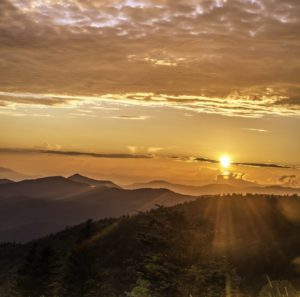How Beautiful, Dark and Green is My Country: A View from the Appalachian Mountains, U.S.A.

Image Credit: Griffey’s Sunshine Photography
“God made the coal and he hid it. Then some fool found it, and we’ve been in trouble ever since.” From the United Mine Workers Journal, 1976
My paper was inspired by a 1939 novel and later film, “How Green Was My Valley” and the Blue Ridge Parkway Appalachian Mountains in the U.S.A. For those who have seen the film you will understand and for those who have not, let me briefly share it. The story is about a family from a Welsh mining community. We are given a window to another time and place at the rise of the 20th century. A joyous, yet hard time, where few work options existed for men. A time where a woman’s duty was to her family, conveniently serving as a model to how she would start her own family.
Like the narrator, I too looked at “How Green Was My Valley” with nostalgia for a simpler time; A place where one’s job was passed on to the next generation, from father to son and from mother to daughter. Yet, I also considered the price paid when working in coal mines. Environmental and Cultural Historian, Rachel Gross and Environmental Researcher and Writer, Trish O’Kane excellent paper on Coal reference Scottish coal mines in the 17th century. In their paper, they point to the writings of Barbara Freese, Environmental Attorney, “whole families were bonded for life to a coal mine … families came to be regarded as property, and if a mine was sold, they would be sold with it.” America doesn’t seem to have fared any better.
Gross and O’Kane’s research indicates that “Coal mining in the United States continues to be a very hazardous occupation because of explosions, poisonous gases, floods, collapsed roofs, and respiratory diseases like black lung.” Mind you, such concerns were not the focus of the family and community in the story. No, the real turmoil faced by the miners was the sudden decrease in wages, or worse, loss of jobs. And, yet, each was dependent upon the other to survive.
Why did the community not question their proximity to the mine and its daily gush of black smoke into their sky falling over their “green valley?” Better still, why didn’t the narrator bring this up? I imagine he, like the reader, was enthralled with the beautiful story of his family and community in the green valley.
“The American Dream,” a Beautiful Story
The title, “How Dark Was My Valley,” seems more apropos for the community in the green valley, given the hardships endured in the past and the dangerous work that coal mining entails. This leads me to my point – beautiful stories are sometimes filled with ugly truths. The America we have lived in is the beautiful story of “The American Dream” and like a “green valley” yearns to be told over and over, singing the tune of nostalgia for a simpler time, albeit a time that’s passed.
One thing is certain, America was built by men and women with vision, courage, heart, brains, and hard work. Americans who in the midst of the dusty air, still smiled and saw “how green [was their] valley. The coal mines of the Appalachian are an example of a time the future is set on leaving behind. Sadly, that includes the miners, their families and communities. And no matter how compelling the argument for “green” jobs is, nothing you say or do will take the place of a well-earned legacy embracing a tradition where one proudly bared coal on their face and hands cleansed only by tears of pain.
Listen, Our Country is Crying
History appears to run in circular motion like the rings of a tree. And like a tree, people in a community are subject to the elements. Man ultimately inherits the land, environment he creates, and the people he affects. The story of “Cry, the Beloved Country” is not a story of a coal mining village in Wales but of a remote agricultural village in South Africa. It is about family, community division, facing deep loss, looking to faith and their beloved land and country.
It seems every country has a story to tell of their beloved country. In the social unrest, if one truly listens, one can almost hear the land crying for the next generation:
“Cry, the beloved country, for the unborn child that is the inheritor of our fear. Let him not love the earth too deeply. Let him not laugh too gladly when the water runs through his fingers, nor stand too silent when the setting sun makes red the veld with fire. Let him not be too moved when the birds of his land are singing, nor give too much of his heart to a mountain or a valley. For fear will rob him of all if he gives too much.”
Have coal mine workers and farmers been treated unfairly? Yes, some would argue. By the same token, the same can be said of jobs in the city. However, working in coal mining and farming gives one a sense of pride and meaningfulness; a valuable asset one sees little of in the big cities. Alas, city folk have found that the “land of Oz” veils an ugly truth and that “there’s no place like home” in our beloved country.
The Kingdoms of Coal
Since the Agriculture, Industrial, and now Technological Revolution there has not been “pot of gold” at the end of the rainbow for everyone, but there has been “pots of coal.” According to World Coal Association, “coal reserves are available in almost every country worldwide…The biggest reserves are in the USA, Russia, China and India.” Yes, coal is big business. But who are we to complain? We demand and companies supply.
However, we didn’t become an electrically powered world overnight. In fact, “The practice of using coal as an energy source has been around since ancient times.” Yet, living in modern times has not safeguarded us from coal’s deadly costs. “The contaminated byproducts of the Appalachian mountains are now held in over 700 slurry reservoirs…that can leach into surface and groundwater.”
Naturally, coal mining has become controversial. People condemn the practice, yet they reap the energy derived from it. It’s no surprise discussions of climate change point to jobs in the coal industry as “dull, dirty, and dangerous,” ready to replace them with “green jobs,” that are “greener, cleaner, and smarter.”
Words of advice: For those of you who point to the ““canary in a coal mine,” arguing that coal miners should have seen this coming or chose not to change with the times, close your eyes and think back to another time and place before your job was replaced by the ATM, Digital Register, Internet, Artificial Intelligence… Yep, “there’s an App for that.” Did you see that coming? I am reminded of Shakespeare’s “Richard III” horse and kingdom quote which I will rephrase: A job, a job, my kingdom for a job. Ahh, my kingdom. It was good to be King!
